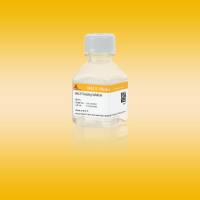Transient Gene Expression and MACS Enrichment
互联网
858
The analysis of the effects of expression of one viral protein on the host cell separately from the effect of other viral proteins is often limited by the efficiency of the transfection method. Lymphoid cells are effectively transfected by electroporation (1 –4 ). However, the transfection efficiency varies usually between 5 and 20% of the living cells, depending on the cell line used. In the case of primary lymphoid cells, the transfection efficiency is below 5% (5 –7 ). Thus the analysis of the influence of viral genes on the expression of cellular proteins is often impossible because of the predominance of untransfected cells. In addition, some viral genes could result in cytostasis, such as latent membrance protein 1 (LMP1; 8 ). The establishment of cell lines, where the viral gene is expressed constitutively or in an inducible fashion, is one way to try to address the problem, but is associated with a selection process (8 ,9 ). This selection process prevents the analysis of early effects of expressed viral genes and could also lead to secondary cell culture effects not associated with the viral gene. Often, inducible gene expression systems are difficult to modulate and can be leaky. To overcome these problems, it is useful to analyze transiently transfected cells and enrich them to obtain pure cell populations without a selection process. A number of methods exist, with magnetic- or fluorescence-activated cell sorting (MACS/FACS) being the most common approaches used (10 ). FACS and MACS are powerful and sophisticated methods for efficient purification of cells expressing a specific immunological marker molecule. Since the introduction of the green fluorescence protein (GFP) the purification of cells by FACS is no longer limited to immunological-stained proteins, which thus opens new applications for this approach.









